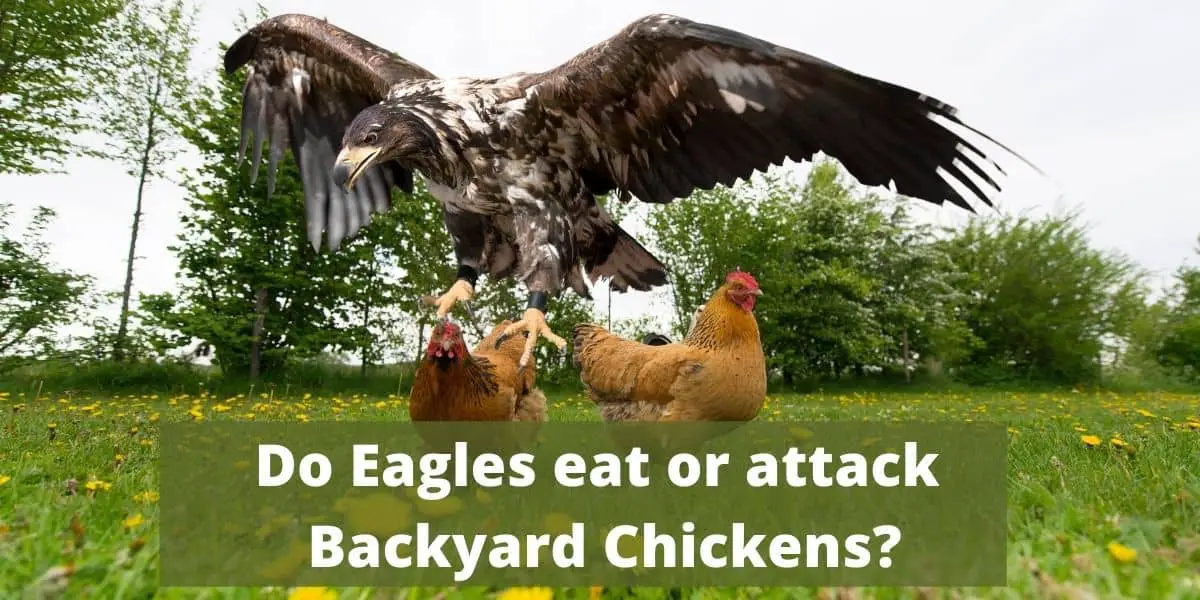Just when you thought that you have finished securing the coop from snakes, badgers, bobcats, and other predators, the worry of overhead attacks becomes apparent. If you live in an area where eagles or other raptors make their home, your chickens could be at risk of being taken or ripped apart.
Eagles are opportunistic predators of chickens. Depending on their habitat they primarily hunt their diet of medium-sized mammals like rabbits, other birds, and fish. Eagles will not deliberately seek out your coop, but when other food sources are scarce they will go in for the kill. Chickens are quickly dispatched by a predatory eagle which will eviscerate and tear them to ribbons.
There is something magnificent about observing the flight of a bald eagle or other birds of prey. But if those powerful talons are going to sink into your beloved hens, they are the stuff of nightmares. For example, one Georgia pastured poultry farm suffered unrelenting losses every winter from bald eagles that would descend on their flocks.
Table of Contents
How do eagles attack chicken?
Eagles can take out chickens from the sky, but if they are feeling confident they may even land and pick off hens at ground level.
An aerial attack involves the eagle swooping down, claws unfurled, and sinking them straight into a chicken that is plucked from the ground.
The prey will meet its end high up in a tree where the eagle tears and picks it apart with its razor-sharp beak and talons.
Eagles have a crop that can store up to two pounds of meat for later use or their young. The feathers and other remains are discarded, a nasty find for an unsuspecting owner.
Missing or predated hens? Here are some signs of a bird of prey kill.
- A single hen has completely disappeared. This is most common as the eagle or hawk will carry off the bird to devour it elsewhere.
- Powerful beaks and talons will shred a chicken to ribbons or strips.
- The remains show that the majority of the injuries the chicken has sustained have been to the back and breast area. Raptors will eat the breasts of the bird first.
- The head of the chicken is missing
- Feathers have been plucked out of the bird.
- If you are searching for a missing bird in and around trees, you find gore and blood at the base of the tree.
Key aerial predators of your chickens that you need to watch out for
Eagles are not the only birds of prey that can eat or attack backyard chickens. Other predatory birds will go in for the kill in much the same way. Put these other aerial predators on your Most Wanted list:
- Crows: Crows are very common and if you have young or sickly chickens among your flock, they are more likely to meet their end at the beak of a crow, than the talons of a raptor. Crows are unable to carry off a chicken but will attack weakened hens or chicks on the ground or pick at the carrion of other predators.
- Hawks: These raptors are daytime predators of free-range hens and will watch their prey for a time before swooping in. The force at which its extended talons hit a chicken is likely to kill the bird on impact. They then will remove the bird to an elevated perch where it can eat undisturbed.
- Owls: These twilight and nocturnal hunters are attracted to a coop by the mice that form a large part of their diet. Smaller owls like barn owls are unlikely to attack chickens but may take chicks. The larger and more powerful Great Horned Owl will take chickens that are out of the roost at night.
Secure your coop and backyard from an opportunistic overhead attack.
- Overhead netting: Aviary netting, plastic nets, chicken wire, or wire mesh can be used to completely cover and contain a smaller run. Larger runs can be partially covered, providing somewhere for the chickens to run in the event of an attack.
- Provide plenty of covers: Your free-range hens will benefit from hedges, trees, and shrubs that they can dart under quickly if they feel threatened.
- Dogs: Experienced pastured poultry farmers use Livestock Protection Dogs to ward off aerial and other predators. The loyal Great Pyrenees breed of dog is particularly suited to this task.
- Rooster: A rooster is also a great guardian of a flock of hens. He will be your eyes and ears 24 hours a day and keep a valiant watch for birds of prey, alerting the flock and driving them to cover.
- Lock up your ladies at night: Ensuring all your hens enter the roost at night and securing it must become routine or owls will take advantage.
If you are losing hens to the local eagle or hawk, don’t take things into your own hands!
Losing your poultry to birds of prey is disheartening and if the problem is recurrent, quite frustrating. You may feel tempted to trap or kill the offending predator but is important to refrain from this urge as, in most countries, these powerful birds are protected by enforceable environmental laws.




